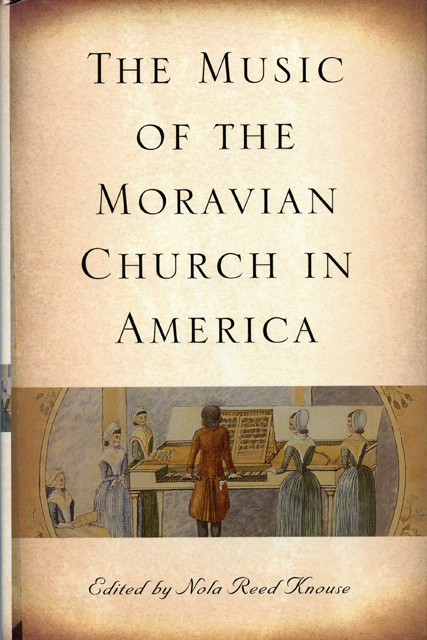Book contents
- Frontmatter
- Contents
- List of Illustrations
- Foreword
- Preface
- Acknowledgments
- 1 The Moravians and Their Music
- 2 Moravian Worship: The Why of Moravian Music
- 3 Hymnody of the Moravian Church
- 4 Moravian Sacred Vocal Music
- 5 The Organ in Moravian Church Music
- 6 The Role and Development of Brass Music in the Moravian Church
- 7 The Collegia Musica: Music of the Community
- 8 Music in Moravian Boarding Schools through the Early Nineteenth Century
- 9 The Piano among the Moravians in the Eighteenth and Nineteenth Centuries: Music, Instruction, and Construction
- 10 Moravian Music: Questions of Identity and Purpose
- Appendix 1 Biographical Sketches
- Appendix 2 A Moravian Musical Timeline
- Bibliography
- List of Contributors
- Index
- Eastman Studies in Music
5 - The Organ in Moravian Church Music
Published online by Cambridge University Press: 10 March 2023
- Frontmatter
- Contents
- List of Illustrations
- Foreword
- Preface
- Acknowledgments
- 1 The Moravians and Their Music
- 2 Moravian Worship: The Why of Moravian Music
- 3 Hymnody of the Moravian Church
- 4 Moravian Sacred Vocal Music
- 5 The Organ in Moravian Church Music
- 6 The Role and Development of Brass Music in the Moravian Church
- 7 The Collegia Musica: Music of the Community
- 8 Music in Moravian Boarding Schools through the Early Nineteenth Century
- 9 The Piano among the Moravians in the Eighteenth and Nineteenth Centuries: Music, Instruction, and Construction
- 10 Moravian Music: Questions of Identity and Purpose
- Appendix 1 Biographical Sketches
- Appendix 2 A Moravian Musical Timeline
- Bibliography
- List of Contributors
- Index
- Eastman Studies in Music
Summary
Beginning with the renewal of the Moravian Church in the early eighteenth century, organs and organists played an essential role in church and community life, and continue to do so today. In perhaps no other religious community of early America did the organ have such an important and visible presence in the daily life of its members as it did among the Moravians. Moravians were a Germanspeaking people, and one Episcopal visitor to Lancaster, Pennsylvania, commented on the practice of religion by German ethnic groups: “[T]hey place almost half their devotion in their organs.” As William Armstrong observed, the service of dedication for a new organ in a Moravian church was second in importance only to the consecration of a new church building. Although some large urban churches of other denominations obtained organs at an earlier date than did the Moravians, these cases are somewhat isolated and rare. The scope of this study is largely restricted to an examination of how American Moravian communities of the eighteenth and early nineteenth centuries used the organ, as well as the influence Moravian organs had on related activities of early America. The contributions of some prominent Moravian organists of the late nineteenth century mark the transition to modern times.
Moravians wrote extensively about the performance practice for organ in their worship services. A few surviving instruments over two hundred years old allow us to hear the type of sound they preferred. Printed books and manuscript documents contain information on the use of improvisation during hymn singing. A few anthems and hymns provide performance directions relating to dynamics, fingering, and organ registration. The specifications of organ stops included in instruments built for Moravian churches differed from those used in other denominations, such as Lutheran, Reformed and Roman Catholic churches. The presence of organs in various meeting rooms and worship spaces in the eighteenth and nineteenth centuries attested to the instrument's important function in the daily life of the Moravians.
- Type
- Chapter
- Information
- The Music of the Moravian Church in America , pp. 133 - 168Publisher: Boydell & BrewerPrint publication year: 2009



